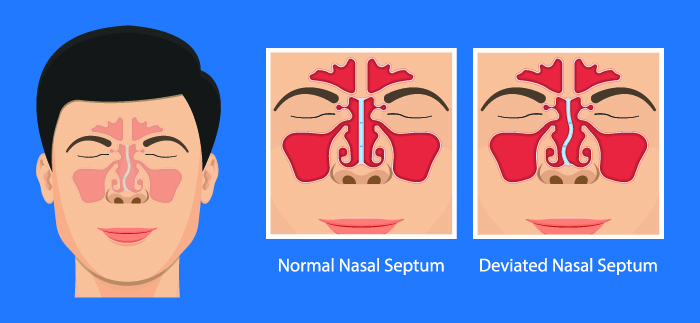Deviated Septum Surgery in MRC Nagar, Chennai
Introduction
The displacement of the wall between the nasal passage leads to a deviated septum. There are many cases where the deviated septum is a congenital disability as the nasal septum is not in the center. In the case of a severely deviated septum, there are chances of breathing issues. In such instances, visiting a breathing specialist nearby should be your priority.

Types of Deviated Septum
- Vertical anterior deviation
- Vertical posterior deviation
- S-shaped septum
- Horizontal spores on one side with or without massive distortion on the opposite side
- Type V with a deep groove on the concave surface
- Any combination of the above
Symptoms of Deviated Septum
Nosebleeds - A nosebleed is the loss of blood from the tissue that lines the inside of your nose. The surface of your nasal septum may become dry, increasing the risk of nosebleeds.
Problems in breathing from one or both nostrils - The obstruction to breathe through the nostril(s) is common. It happens in the same way during cold or allergies can cause your nasal passages to swell and narrow.
Snoring - Since the nostril gets blocked, it is more likely to cause loud snoring while you sleep.
Sinus infections - Sinusitis is an inflammation or swelling of the tissue lining the sinuses.
If you face any of the symptoms mentioned above, You should visit an ENT specialist near you.
Causes of Deviated Septum
Condition from birth - Someone who is born with the deviated nasal septum.
Fall or injury to the nose - In infants, there is a possible occurrence of accidents at childbirth. These accidents may lead to a nose injury. Further, any complication can lead to the deviated septum in childhood and adulthood.
Trauma to the nose - There are common incidents of nose trauma in rough sports like wrestling, football, etc.
When to Visit a Doctor
Frequent sinus infections - A deviated septum can stop the drainage of your sinuses, which can lead to infections.
Difficulty breathing - A deviated septum can obstruct one or both nostrils, obstructing breathing through your nose.
Frequent nosebleeds - When your septum deviates, nasal passages dry up, which causes frequent nosebleeds.
Difficulty sleeping - Difficulty in sleeping as the nostril blocks the breathing while you are asleep.
Request an appointment at
Apollo Spectra Hospitals, MRC Nagar, Chennai
Call 1860 500 2244 to book an appointment
Risk Factors Associated with Deviated Septum
Disturbed sleep - Due to uncomfortable breathing, you will have an unpleasant sleep.
Pressure on the nose - At times, nasal passages can show symptoms of congestion.
Sinus - If a Deviated septum is carried away further without treatment could lead to infections on nostrils and eventually to the sinus.
Dry mouth - Due to difficulty in breathing, continuous breathing from the mouth causes dry mouth.
Treatment of Deviated Septum
Some of the treatments are medical and surgical, depending on the severity of the condition.
Decongestants - Decongestants generally refer to medication on recommendation from an expert that minimizes the nasal tissue inflammation, helps to keep the airways balanced on both sides for free flow. Decongestants come in as a pill or spray that helps maintain enough space for both nasals for airflow.
Antihistamines - On the doctor’s suggestions, antihistamines can help your running nose. They can also sometimes help decrease conditions occurring during a cold.
Nasal steroid sprays - Corticosteroid sprays for your blocked nose is another way to keep your nasal passage wide open for precise airflow.
Septoplasty - Septoplasty is the most common way to repair a deviated septum through surgery. During septoplasty operation, your nasal septum is repositioned to balance in the center of your nose that includes removing extra parts or reinstalling to give the septum enough space for easy airflow for breathing.
Request an appointment at
Apollo Spectra Hospitals, MRC Nagar, Chennai
Call 1860 500 2244 to book an appointment.
Conclusion
It is strictly advised to consult with a deviated septum specialist near you whenever you face issues like bleeding nose, disturbance in breathing, or very often sinus.
Surgery is usually recommended when medical therapy doesn’t help your stuffy nose. Often, over-the-counter and prescription allergy medications are prescribed.
A deviated septum can block one side of the nose, making breathing through that side difficult. Some people have such a difficult time breathing that they suffer from sleep apnea.
Medicines can help you up to a certain level. However, surgery is recommended as there is no other way to replace the septum.
Symptoms
Our Doctors
DR. DEEPIKA JEROME
BDS...
| Experience | : | 14 Yeras Experience |
|---|---|---|
| Speciality | : | Dental and Maxillofa... | Location | : | MRC Nagar |
| Timings | : | Mon - Sat : 9:30 AM ... |
DR. PRABHA KARTHIK
MBBS, DNB...
| Experience | : | 7 Yeras Experience |
|---|---|---|
| Speciality | : | ENT, Head and Neck S... | Location | : | Alwarpet |
| Timings | : | Mon - Fri - 12:30p... |
DR. SUNDHARI V
MBBS, DNB...
| Experience | : | 27 Yeras Experience |
|---|---|---|
| Speciality | : | ENT, Head and Neck S... | Location | : | Alwarpet |
| Timings | : | Mon - Sat : 10:00 AM... |
DR. ELANKUMARAN K
MBBS, MS (General Su...
| Experience | : | 20 Yeras Experience |
|---|---|---|
| Speciality | : | General Surgery & Ga... | Location | : | Alwarpet |
| Timings | : | Available by prior a... |
DR. SATHYA NARAYANAN
MBBS, MS (ENT)...
| Experience | : | 4 Yeras Experience |
|---|---|---|
| Speciality | : | ENT, Head and Neck S... | Location | : | Alwarpet |
| Timings | : | Mon - Sun : 2:00 PM ... |
DR. M BARATH KUMAR
MBBS, MD (INT.MED), ...
| Experience | : | 12 Yeras Experience |
|---|---|---|
| Speciality | : | General Surgery & Ga... | Location | : | Alwarpet |
| Timings | : | Wed : 3:30 PM to 4:3... |
DR. ANAND L
MS, MCh (GASTRO), FR...
| Experience | : | 21 Yeras Experience |
|---|---|---|
| Speciality | : | General Surgery & Ga... | Location | : | MRC Nagar |
| Timings | : | Mon - Sat : 8:00 PM ... |
DR. KARTHIC BABU NATARAJAN
MBBS,MD, DNB...
| Experience | : | 13 Yeras Experience |
|---|---|---|
| Speciality | : | Pain Management... | Location | : | MRC Nagar |
| Timings | : | On Call... |
DR. MURALEEDHARAN
MBBS,MS (ENT), DLO...
| Experience | : | 34 Yeras Experience |
|---|---|---|
| Speciality | : | ENT, Head and Neck S... | Location | : | MRC Nagar |
| Timings | : | Mon - Sat : 4:30 PM ... |
DR. SHEERIN SARAH LYSANDER
MBBS, MD(Anesthesiol...
| Experience | : | 8 Yeras Experience |
|---|---|---|
| Speciality | : | Pain Management... | Location | : | MRC Nagar |
| Timings | : | Mon - Sun : 7:00 AM ... |
DR. ADITYA SHAH
MBBS, MD, DM (Gastro...
| Experience | : | 6 Yeras Experience |
|---|---|---|
| Speciality | : | General Surgery & Ga... | Location | : | Alwarpet |
| Timings | : | Mon - Fri : 5:00 PM ... |
DR. KAVYA M S
MBBS, MS (ENT)...
| Experience | : | 13 Yeras Experience |
|---|---|---|
| Speciality | : | ENT, Head and Neck S... | Location | : | Alwarpet |
| Timings | : | Available on prior a... |
DR. RAJASEKAR M.K.
MBBS,DLO.,MS(ENT)...
| Experience | : | 30 Yeras Experience |
|---|---|---|
| Speciality | : | ENT, Head and Neck S... | Location | : | Alwarpet |
| Timings | : | Mon, Wed, Fri - 6:... |
DR. NIRAJ JOSHI
MBBS, Ph.D, DLO, FAG...
| Experience | : | 8 Yeras Experience |
|---|---|---|
| Speciality | : | ENT, Head and Neck S... | Location | : | Alwarpet |
| Timings | : | Mon - Sat - 6:00pm -... |
DR. ADITYA SHAH
MBBS, MD, DM (Gastro...
| Experience | : | 5 Yeras Experience |
|---|---|---|
| Speciality | : | General Surgery & Ga... | Location | : | MRC Nagar |
| Timings | : | Mon - Sat : 6:00 PM ... |
DR. SUNNY K MEHERA
MBBS, MS - OTORHINOL...
| Experience | : | 8 Yeras Experience |
|---|---|---|
| Speciality | : | ENT, Head and Neck S... | Location | : | MRC Nagar |
| Timings | : | Mon - Sat : 2:00 PM ... |
DR. ULAGESWARI R
MBBS, MS ENT, Head a...
| Experience | : | 8 Yeras Experience |
|---|---|---|
| Speciality | : | ENT, Head and Neck S... | Location | : | MRC Nagar |
| Timings | : | Mon to Sat : 9:00 AM... |
DR. V.J. NIRANJANA BHARATHI
MBBS, MS (ENT)...
| Experience | : | 9 Yeras Experience |
|---|---|---|
| Speciality | : | ENT, Head and Neck S... | Location | : | MRC Nagar |
| Timings | : | Mon - Sat : 10:00 AM... |
Our Top Specialities
NOTICE BOARD
CONTACT US
CONTACT US
 Book Appointment
Book Appointment




















.svg)
.svg)
.svg)
.svg)








